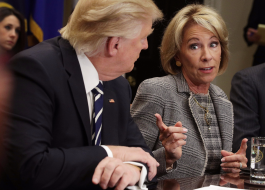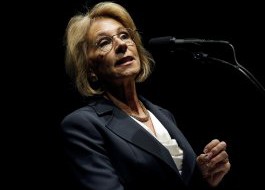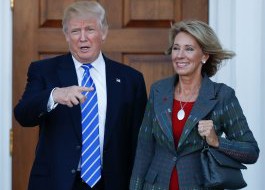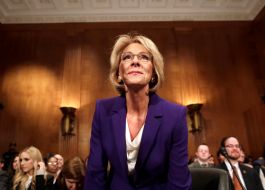
US Secretary of Education Betsy DeVos offered a telling analogy for how she views education during a recent keynote speech held at the Brookings Institution on March 29.
DeVos, a vocal advocate for school choice, drew a comparison between consumers picking ridesharing services like Uber or Lyft over a taxi to parents electing to send their kids to private or charter schools over public schools.
Russ Whitehurst, a senior fellow at the Brookings Institution and moderator of the event, says the analogy serves as an important and perhaps troubling window into DeVos' view of education.
By comparing school choice to an ordinary consumer decision, DeVos and the Trump administration paint education as something like a business, which is susceptible to the usual market forces of consumer choice and innovation through competition.
Meanwhile, some research suggests opening public schools up to competition runs the risk of hurting the poorest students, who live in areas where public school is their only option.
"Just like the traditional taxi system revolted against ridesharing, so too does the education establishment feel threatened by the rise of school choice," DeVos said.
Whitehurst argues DeVos hasn't yet addressed the implications of her analogy. Total freedom may be good in picking Uber over Lyft, or one restaurant over another, because the stakes are low, he says. If a consumer is unhappy with their choice, he or she can spend money someplace else next time.
But education wouldn't offer consumers — in this case, parents — such immediate and necessary feedback.
"If you pick a bad restaurant, you know it's a bad restaurant pretty immediately," he tells Business Insider. "If you pick a bad school, you're probably not in a position to know that until your child is failing at the next step."
According to Whitehurst, comparing school choice to using Uber over a taxi ignores the fact that one is a private good, while the other is a public good.
If yellow taxis go out of business, it's likely because Uber has found better ways to cater to people's desires for getting around. But if charter and private schools draw enough kids out of public schools to shutter them, those lingering public school students can't automatically enroll in a competing style of education.
In other words, in a market where public schools are at the mercy of local property taxes to maintain funding, unregulated competition can leave the poorest families with no choices at all. As a result, public schools would end up serving primarily low-income — and, therefore, generally low-performing — students.
So far, the research on school choice has mostly involved vouchers. And it indicates they have not had the hollowing-out effect on public schools that people have feared. But Whitehurst concedes the Trump administration is just getting started; it hasn't released much information just how widely it will seek to expand voucher programs or other forms of school choice.
In Whitehurst's ideal world, top-down regulation — the kind DeVos and Trump want to avoid — could help guide parents to make smart decisions. Instead of choosing between 200 schools, for instance, parents could get information from the government that helps them pick between a dozen — a version of the kind of system currently in place in Boston, Whitehurst says.
Even if parents know what's best for their child personally, Whitehurst says, education experts still know what's best for children overall.
"There's a strong role for the system, whether it's the federal system or a state system, in thinking about those issues," Whitehurst says, "and seeing that the two-ways process is a better one."




